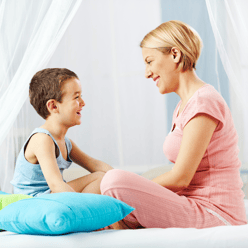-1.png)
EtonHouse Singapore
As teachers, we are constantly aiming to build and nurture trusting and honest relationships with parents and children. Together as invested stakeholders in children’s development and learning journey we are able to unpack respectful parenting techniques and strategies that support both parents and children with transparency and honesty. In a time where mindfulness is trending in education, we are often engaged in meaningful dialogue with parents who eagerly search for mindful and respectful parenting strategies that truly support challenging home routines and difficult emotional encounters that happen as a normal part of life. As we navigate the complexities of the ‘new normal’ with covid-19 in our lives, this topic has become a daily dialogue between teachers and parents.
As the Wellbeing Team Ambassadors at EtonHouse Sentosa, we often use 3 main focus points for Respectful Parenting with suggested tools and techniques that we hope improve our ability to adjust, explore and find what works best for each unique family. In this article, we will be covering the first focus point.
The power of our words
Our image of a child has definitely evolved over the years as we move from traditional/authoritarian ways of seeing children as ‘empty vessels waiting to be filled’ to realising and acknowledging how children are also human beings carefully observing all other human beings in the world around them as they analyse and test modelled behaviours. As respectful parents/teachers, we honour children as human beings who are born intrinsically curious, constantly learning, adapting, and applying what they hear, see and feel as they express themselves. We, as adults, can further consider the importance and value placed on words we choose to use in each moment with young children as the impact and long-term effects are being embedded in their developing self-identity.

The way in which we “see” children, directly impacts the power of our words and through these interactions and expectations of children, we begin to help shape and define who they are and how they communicate confidently with others in every moment of each day. If we “see” children as incapable and unable to do things or complete daily tasks which we feel require our support every step of the way, the child will indeed view themselves as incompetent and with low self-esteem in achieving physical, cognitive and emotional goals. However, if we believe and see children as capable, curious individuals who are respected in what they have to offer from birth, their emotional growth mindset and determination to take positive control with minor or major challenges in their daily life experiences become something very achievable for them. They will develop that innate sense of grit, agency to problem solve, express their thoughts and ideas in order to build on their self-reflection and personal development as human beings. For example, taking time to consider, at an age-appropriate level, what we do FOR or WITH children and how we are talking AT or TO children at each moment.
As we steer towards the “with” versus the “for” and talk “to” rather than “at” children, we are building on their sense of value as an important person. As respectful adults/parents/teachers, we can unpack the powerful impact our words have on children’s actions, reactions, choices, and decisions in aspects of their life.
Fig 1 and 2. We are Teachers and Our Little Playnest
Parents are children’s first educators, role modelling the power of words and it is our responsibility to respect and appreciate children by:
- Giving children choices so they feel in control and have agency with decisions
- Role modelling problem-solving strategies by verbalising expectations together
- Providing opportunities for age-appropriate responsibility
- Listen to your child with their ‘whole’ body
- Respond to your child’s gestures with words to empower their actions/needs. For example, I can see you have your arms up, would you like a cuddle.
- Take a breath, notice your body language when you respond instead of reacting
- Acknowledging and celebrating their uniqueness as well as their positive self-talk as they begin to see themselves as competent and capable people
- Using words beyond “happy, angry, sad” to describe how they may be feeling / what they are observing. For example, I can see how that may make you feel “surprised, frustrated, lonely, disappointed”
- Be brave to talk to your young or older child using respectful statements like, I can see you are sharing something really important. Let’s work it out together.
(Bringing Up Great Kids - Australian Childhood Foundation Professionals, 2021)
The challenge as adults, living a busy fast-paced life with multi-tasking as an expectation nowadays, moments of challenge can happen rapidly and on numerous occasions throughout the day and we have the responsibility of noticing and supporting children through each of these moments as best we can. It is important to remember to breathe in these moments. First, acknowledge your own emotions, thoughts and feelings, even just for a few seconds, take time to pause, and then respond to each situation with empathy, kindness, and honesty. Ask yourself if you are about to ‘react or respond’ as a regulation strategy.
.png?width=294&name=Cream%20Love%20Quote%20Instagram%20Post%20(1).png)
When we have realistic expectations of children moving through each developmental milestone and guide them whilst increasing their responsibilities using positive language to extend them, we are then truly listening to children and modelling strategies for their future toolbelt. Our words are powerful, listen carefully to your child by watching their whole body dispositions, facial gestures, and their own voices and actions as you respond in each and every moment because children are highly intuitive and always watching us as this informs them of who they are and who they want to be.
We share in the second part of the article the power of emotions and positive behaviour guidance.
Written by EtonHouse International School
Wellbeing Committee Teachers:
Stephanie Hill, Daria Ignatova, Tracy Dawson
Endorsed by EtonHouse Executive Director: Yi Xian Ng

-1.jpg)